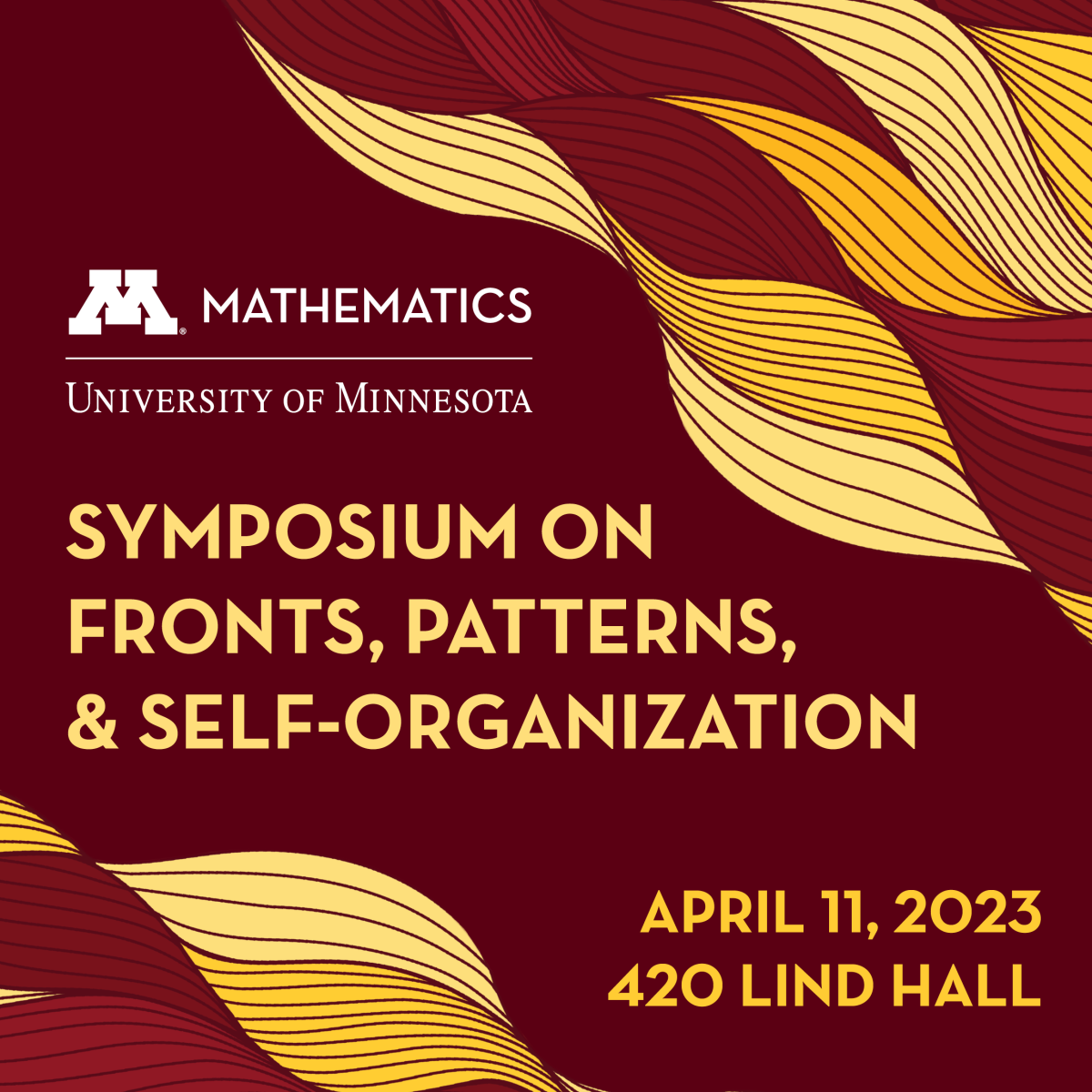Symposium on Fronts, Patterns, and Self-Organization
The Symposium on Fronts, Patterns, and Self-Organization will feature three 40-minute invited presentations on complex systems in the sciences and engineering, where fronts and patterns play an important role in the self-organized properties of the system. The talks will emphasize open questions and leave ample room for discussion. The symposium will also include several shorter contributed presentations.
Schedule
10:30-11:15 • Arjen Doelman: Pattern Formation in Inhomogeneous Systems
11:15-12:00 • Short presentations
12:15-1:15 • Lunch – Don't forget to register above if you would like to join for lunch.
1:30-2:15 • Paul Carter: Instability of planar interfaces in reaction-diffusion-advection equations
2:15-3:00 • Keith Promislow: Surface adhesion in soft matter systems.
3:00-3:30 • Discussion and outlook
Abstracts
Pattern Formation in Inhomogeneous Systems • Arjen Doelman
Mathematical studies of the dynamics of patterns typically focus on homogeneous models, i.e. systems of PDEs in which the coefficients do not explicitly vary in time or space. This is quite unnatural from a more applied perspective. For instance, assuming that a terrain does not have a topography and/or that the yearly rainfall is constant (in time and space) is a serious oversimplification in the study of ecosystems. Nevertheless, homogeneous models are commonly used in ecological studies. In this talk we’ll consider various aspects of the impact of spatially varying coefficients on the dynamics of patterns in several (conceptual) reaction-diffusion equations. We will first consider the natural issue of the persistence of known structures – such as localized pulses or fronts – under perturbation by inhomogeneous effects. Next, we will focus on the perhaps more interesting and relevant question, “What kinds of new dynamics, i.e. dynamics that cannot exist in the homogeneous case, may be induced by inhomogeneous effects?"
Instability of planar interfaces in reaction-diffusion-advection equations • Paul Carter
We consider planar interfaces between stable homogeneous rest states in singularly perturbed 2-component reaction diffusion advection equations, motivated by the appearance of fronts between bare soil and vegetation in dryland ecosystems, as well as multi-interface solutions, such as vegetation stripes. On sloped terrain, one can find stable traveling interfaces, while on flat ground, one finds that sideband instabilities along the interface can lead to labyrinthine Turing-like patterns. To explore this behavior, using geometric singular perturbation methods, we analyze instability criteria for planar interfaces in reaction diffusion advection systems, focussing on a specific Klausmeier-type model, and examine the effect of terrain slope on the stability of the interfaces.
Surface adhesion in soft matter systems • Keith Promislow
Many processes in material science involve entropic contributions from packing – the constraints imposed by volume occupied by other material. Diblock polymers offer a rich environment to study the packing of soft materials as gradient flows of a system energy. Ideas from $\Gamma$ convergence provide powerful tools to extract simplified models in certain singular limits. We present examples of packing dichotomies in which limiting problems may be more complex. We start with an alternate random phase reduction of self-consistent mean field models that leads to density functional energies with stronger nonlocality. We identify regimes in which the energies reduce to a functionalized Cahn-Hilliard energy and examine a strong segregation limit. For the latter, computational results motivate a sharp interface reduced energy for interfaces that balances a classical Canham-Helfrich formulation against a longer-range adhesion term that induces self-stacking behavior observed in various cellular organelles.
Local Organizers: Arnd Scheel & Olivia Cannon
